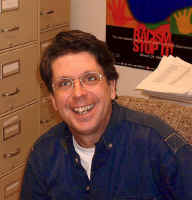Faculty A-Z

Jon Church
Professor Ph.D TorontoBioMedical Sciences
Breast Cancer: Telecommunications & Psychosocial Support
Cancer of the breast is the most common major cancer in Canadian women. Currently, the National Cancer Institute of Canada determines that breast cancer will develop in one in nine women over their lifetime; similar projections suggest that more than15,700 Canadian women will be newly diagnosed with the disease and that 14 women per day will die of it.
For most women, a medical diagnosis of breast cancer is the beginning of a long period of medical treatments and side effects, prognostic uncertainty, disfigurement, and general disruption of life. Twenty to thirty per cent experience a long-term disruption in the quality of their lives through loss of roles and functional abilities, as well as through problems with social relationships Social support can lessen some of the distress experienced by cancer survivors. However, patients are often unable to get sufficient support from friends and family, or their health care professionals. In addition, well-meaning supporters may not be able to fully appreciate what the person with breast cancer is experiencing because of the disease process as they do not have a common frame of reference. For these various reasons, many breast cancer survivors turn to peer groups for needed support. These interventions have been shown to be extremely effective in promoting (long-term) adaptation to breast cancer and may even have an impact on survival. In addition, while our success in treating breast cancer owes a great deal to advances in cell and molecular biology, there is no doubt that much can also result from women and their families being empowered and making informed choices. Often, women who can make informed decisions concerning their medical care, as well as access sources of psychosocial support during treatment and recovery, have an increased ability to fight this disease.
Despite evidence of the effectiveness of support groups, studies have often indicated that only 10 per cent, or less, of potential users receive face-to-face support group interventions. Various barriers account for the under-use of support groups, but for our purposes can be of two principal types: medical (which centre on the impact of the illness and treatment, where, for example, patients are too weak or ill to attend meetings); and, practical (difficulties attending meetings, including a lack of transportation, long distances to travel, sparse population). Breast cancer survivors in rural communities often have more limited access to health and social support services that are available in larger urban centres.
In an attempt to provide more widely available peer support networks and access to timely information for breast cancer survivors and caregivers:
-
Dr. Church owns and administers the Internet discussion listserver "BREAST-CANCER", an unmoderated discussion list open to researchers, physicians, patients, family, and friends of patients, for the discussion of any issue relating to breast cancer. Currently, there are nearly 600 subscribers from over 30 countries - mostly women survivors, but also men and health professionals - and mail volume approaches 100 messages per day.
-
In Newfoundland and Labrador, with the support of the Canadian Cancer Society (CCS), Dr Church facilitates a biweekly program of support via audio teleconferencing. The Telemedicine Centre of Memorial University of Newfoundland operates an elaborate audio teleconferencing network across Newfoundland and Labrador consisting of eleven separate teleconferencing circuits with a total of 217 sites in approximately 147 communities throughout the province. Over 200 women took part in the pilot series, and a preliminary, ad hoc evaluation of this program suggests that it has been helpful in meeting a number of the social support needs of women with breast cancer see CMAJ Article. A proposal for a qualitative study of the teleconferencing support network made to the Maritime Centre of Excellence for Women's Health has been funded; click here to see results of the study.
-
Dr Church has developed and maintains a World Wide Web (WWW) page created in conjunction with the Purple Lupin Project. This is a public education-dedicated site. With links to existing pages dedicated to basic scientific and clinical information, extensive databases concerning alternative/unconventional therapies and regional community resources, and connections to the BREAST-CANCER listserver, the Purple Lupin Project offers a centralized and freely accessible resource to all people affected by this disease. In 1997 was named "Best of the Web" by the editors of Snap! Online and HealthyWay, a Sympatico company.
KEYWORDS: breast cancer, breast cancer information, psychosocial support, peer support, communications, Internet, audio teleconferencing, World Wide Web, alternative or complimentary cancer therapies.
BREAST-CANCER: An open Internet discussion list for any issue relating to breast cancer. To join and receive all postings, send a "SUBSCRIBE BREAST-CANCER <your name>" message to LISTSERV@MUN.CA. You may leave the list at any time by sending a "SIGNOFF BREAST-CANCER" command to LISTSERV@MUN.CA.